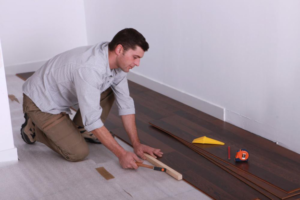There used to be a time when engineered hardwood was considered a cheap alternative for solid hardwood floors. Solid hardwood always remained in the limelight and was widely considered the only true kind of hardwood flooring for a home.
Well, times have changed. Today, you can go to any home or office, and engineered hardwood won’t be very hard to find. That’s probably because it’s just as beautiful and can be used in more places than solid wood flooring. Experts believe that the market for engineered hardwood will skyrocket to $41,273 million by 2022. Part of that is the new high-quality engineered products that become available.
Both types of hardwood flooring have their share of perks and drawbacks. Let’s walk you through some of them below!
Engineered Hardwood
Consider engineered hardwood a hybrid wood floor variety. It’s made up of a plywood base and a variable thickness wear layer made of sliced hardwood. The plank thickness varies between 3/8” and ¾” and from 4” to 12” wide.
The main advantage of this type of hardwood is that it’s fairly easy to install especially if it’s prefinished. Engineered flooring can also be installed in humid climates or “Below Grade” in a basement. It can also be glued down over a concrete subfloor.
However, take note of the location of your house and the rooms in which you want to fit engineered flooring. Some homeowners will opt to use Solid flooring in the upstairs and ground floor of their home while using an engineered version in the basement below grade. A custom floor provider like Oak & Broad can make matching solid and engineered flooring for different parts of your home.

Solid Wood
Top to bottom, side to side, solid hardwood is just pure hardwood. Its planks are generally ¾-inches thick and range between 5 to 11-inches in width.
Unlike engineered hardwood, the solid variety can undergo sanding multiple times and can be significantly more durable. In fact, if you keep your floors well-maintained, solid hardwood can easily last you 50-100 years.
However, there’s one thing you’ve got to be careful about and that’s moisture. Solid hardwood isn’t as great as engineered hardwood when it comes to dealing with humid climates. If you’re thinking about installing the planks somewhere in your basement, think again.
So, which will it be?
Engineered hardwood can be less expensive but solid lasts longer. Depending on your preference and the needs of your home, you can alternate between both types and install something different in each room!
Simply get in touch with our experts and let them help you define your hardwood flooring needs. Oak and Broad delivers premium-quality, customized hardwood flooring all across the country. Check out some of our previous site-finished, engineered, and solid hardwood flooring projects!
